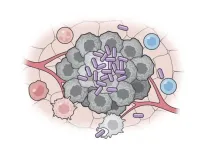(Press-News.org) Washington, D.C. (October 16, 2024) – For the first time, adults living with congenital heart disease (CHD) now have valuable insights into their long-term quality of life through data from the Congenital Heart Initiative (CHI). CHI is the nation’s first and largest patient-focused registry for adults with CHD and released its first study involving over 4,500 participants from all 50 states.
This research, published today in JAMA Network Open, marks a significant step forward in making better information available for the 1.5 million adults in the United States who were born with CHD.
“Studies like this that leverage actual patient voices and experiences help us get a better sense of how to advise, support and treat people with CHD as they age,” says Anitha John, M.D., Ph.D., director of the Washington Adult Congenital Heart program at Children’s National Hospital and senior author of the study. “Also, researchers get a clearer picture of the questions that need to be answered to make sure they have the best quality of life possible.”
The study also demonstrates two of the most successful models of current promising trends in clinical research:
The power of patient engagement throughout the research process, including design and implementation.
The impact of team science, highlighting the benefits of partnerships between patients, researchers and clinicians.
Key highlights include:
Many participants (88%) reported having one or more additional health issues (comorbidities).
33% had arrhythmias (irregular heartbeat).
35% had mood disorders, including depression or anxiety.
Quality of life is good or better for 84% of people who completed quality of life reporting measures, regardless of the type of congenital heart condition.
People with more complex congenital conditions were less likely to meet physical activity recommendations — an important finding with immediate impact.
Treatments for children born with congenital heart disease have improved so significantly in the last two decades that life expectancy continues to increase as well.
“There are now more adults living with congenital heart disease than there are children with CHD,” says Scott Leezer, patient co-principal investigator for the Congenital Heart Initiative registry and co-author of the study. “However, a significant gap remains in what we know about the adult CHD population. As an adult CHD patient, I was excited to contribute to creating this registry, bringing more answers to people like me who want to know how our unique hearts impact our bodies and quality of life over time.”
The authors note that the study’s findings and the registry data currently have a few limitations. First, the registry only contains patient-reported outcomes and no clinical data. The first sub-study of the CHI, the CHI-RON study, addresses this challenge by incorporating additional data sources for a subset of consenting CHI participants.
Additionally, recall bias, underlying neurocognitive challenges and survey fatigue, may have limited participation in the CHI to a smaller subset of adults with CHD. Efforts are underway to develop methods for people with congenital heart disease who have neurodevelopmental deficits or other disabilities to engage in the registry. The CHI is temporarily closed to new registrants as the study team redesigns the study to better align with the needs of the community.
“We are grateful for everyone who joined this registry, answered survey questions and shared their experiences,” says Thomas Carton, Ph.D., chief data officer at Louisiana Public Health Institute and study co-author. “The CHI registry is a big step forward for adults with CHD, but also can serve as a model for how to bring together physicians, researchers and patients as active participants in care, research and advocacy.”
As the registry grows in the future, it will focus on increasing diversity of participants, developing additional partnerships with other organizations, continued innovation in data usage and improved community engagement, all with the goal of guiding future research that will ultimately improve quality of life for all adults with CHD.
# # #
Contact: Jennifer Stinebiser | jennifer.stinebiser@childrensnational.org | 202-476-4500
About Children’s National Hospital
Children’s National Hospital, based in Washington, D.C., was established in 1870 to help every child grow up stronger. Today, it is one of the top 10 children’s hospitals in the nation and ranked in all specialties evaluated by U.S. News & World Report. Children’s National is transforming pediatric medicine for all children. The Children’s National Research & Innovation Campus opened in 2021, a first-of-its-kind pediatric hub dedicated to developing new and better ways to care for kids. Children’s National has been designated three times in a row as a Magnet® hospital, demonstrating the highest standards of nursing and patient care delivery. This pediatric academic health system offers expert care through a convenient, community-based primary care network and specialty care locations in the D.C. metropolitan area, including Maryland and Virginia. Children’s National is home to the Children’s National Research Institute and Sheikh Zayed Institute for Pediatric Surgical Innovation. It is recognized for its expertise and innovation in pediatric care and as a strong voice for children through advocacy at the local, regional and national levels. As a nonprofit, Children's National relies on generous donors to help ensure that every child receives the care they need. For more information, follow us on Facebook, Instagram and LinkedIn.
END
Study offers better insights into quality of life for adults with congenital heart disease
Findings have implications for the lives of more than 1.5 million U.S. adults
2024-10-16
ELSE PRESS RELEASES FROM THIS DATE:
Researchers offer alternative to hydroxyurea in study of DNA replication process
2024-10-16
Researchers at Colorado State University have identified an alternate method to study changes during the DNA replication process in lab settings using genetically modified yeast. The new approach offers a clearer window than current drug methods used to understand cell cycle arrest – a fundamental mechanism that is key to treating cancers and genetic issues.
The findings were published in the Proceedings of the National Academy of Sciences and were led at CSU by Assistant Professor Grant Schauer in the Department of Biochemistry and Molecular Biology. The work focuses on hydroxyurea, a chemotherapy drug used ...
New diamond bonding technique a breakthrough for quantum devices
2024-10-16
Synthetic diamond is durable, inert, rigid, thermally conductive and chemically well-behaved—an elite material for both quantum and conventional electronics. But there’s one problem. Diamond only likes diamond.
It’s homoepitaxial, meaning it only grows on other diamonds, and integrating diamond into quantum or conventional computers, quantum sensors, cellphones, or other devices would mean sacrificing the diamond’s full potential or using large, expensive chunks of the precious material.
“Diamond stands alone in terms of its material properties, both for electronics—with its wide band gap, ...
Clean air and climate policies provide health benefits in New York City
2024-10-16
A new study analyzes the links between the enactment of major air pollution and climate policies in New York City and significant improvement in air quality during the period 1998-2021. It finds a cumulative beneficial effect of these policies both city-wide and among residents residing in communities that have been disproportionately affected by air pollution.
The study by environmental health scientists at Columbia University Mailman School of Public Health is published in the peer-reviewed journal Frontiers in Public Health.
“Because of the known significant associations between the pollutants studied and multiple adverse health effects, there are important implications for health ...
Folic acid may mitigate link between lead exposure during pregnancy and autistic behaviours in children
2024-10-16
New research gives another reason to take folic acid supplements while pregnant.
A new study by Simon Fraser University researchers has found that folate may weaken the link between blood-lead levels in pregnant women and autistic-like behaviours in their children.
Researchers from SFU’s Faculty of Health Sciences, led by PhD candidate Joshua Alampi, published the study in the journal Environmental Health Perspectives.
“Folic acid supplementation during pregnancy has numerous benefits to child health, especially brain development,” ...
MD Anderson Research Highlights for October 16, 2024
2024-10-16
HOUSTON ― The University of Texas MD Anderson Cancer Center’s Research Highlights showcases the latest breakthroughs in cancer care, research and prevention. These advances are made possible through seamless collaboration between MD Anderson’s world-leading clinicians and scientists, bringing discoveries from the lab to the clinic and back.
Novel therapeutic target overcomes treatment resistance in triple-negative breast cancer
Many patients with triple-negative breast cancer (TNBC) do not respond to combination ...
STEP Demo pilot plant achieves full operational conditions for Phase 1 of testing
2024-10-16
SAN ANTONIO — October 16, 2024 —The Supercritical Transformational Electric Power (STEP) Demo pilot plant, a $169 million, 10-megawatt supercritical carbon dioxide (sCO2) test facility at Southwest Research Institute (SwRI) in San Antonio, has completed its first phase of testing, having achieved its full operational speed of 27,000 rpm and operating at a target turbine inlet temperature of 500 degrees Celsius. As STEP achieved this milestone, it was synchronized with the electrical grid, generating approximately four megawatts of net power.
“Achieving full operating conditions while connected to the grid is a major advancement ...
Women more likely than men to die after heart surgery complications
2024-10-16
Despite having no greater chance of developing problems after high risk cardiovascular surgery, women are more likely than men to die from postoperative complications, a University of Michigan-led study suggests.
A patient dying of complications after surgery is often referred to as a “failure to rescue”.
Investigators assessed more than 850,000 cases of Medicare beneficiaries who had high risk heart surgery — including heart bypass, aortic aneurysm repair, and mitral and aortic valve repair — ...
Bacterial vaccine shows promise as cancer immunotherapy
2024-10-16
Columbia researchers have engineered probiotic bacteria that educate the immune system to destroy cancer cells, opening the door for a new class of cancer vaccines that take advantage of bacteria’s natural tumor-targeting properties. These microbial cancer vaccines can be personalized to attack each individual’s primary tumor and metastases, and may even prevent future recurrences.
In studies using mouse models of advanced colorectal cancer and melanoma, the bacterial vaccine supercharged the immune system to suppress the growth of – or in many cases eliminate – primary ...
Involuntary sweeps of homeless encampments do not improve public safety, study finds
2024-10-16
AURORA, Colo. (October 16, 2024) – A new study, out today in the Journal of Urban Health, finds that involuntary sweeps of homeless encampments in Denver, Colorado were not effective in reducing crime.
Researchers, led by first author Pranav Padmanabhan, research assistant and MPH student at the University of Colorado Anschutz Medical Campus, analyzed the effect of involuntary displacement on crime in one-quarter to three-quarters of a mile radius around sweep sites, among all sweeps between November ...
In utero exposure to maternal COVID-19 and offspring neurodevelopment through age 24 months
2024-10-16
About The Study: In this cohort study of pregnant individuals and offspring, exposure to maternal COVID-19 was not associated with abnormal neurodevelopmental screening results through 24 months’ postpartum. Continued study of diverse groups of children is needed because, among other factors, evidence suggests sensitivity of the developing fetal brain to maternal immune activation.
Corresponding Author: To contact the corresponding author, Eleni G. Jaswa, MD, MSc, MAS, email elenijaswa@gmail.com.
To access the embargoed study: Visit our For The Media website ...
LAST 30 PRESS RELEASES:
Scientists discover why we know when to stop scratching an itch
A hidden reason inner ear cells die – and what it means for preventing hearing loss
Researchers discover how tuberculosis bacteria use a “stealth” mechanism to evade the immune system
New microscopy technique lets scientists see cells in unprecedented detail and color
Sometimes less is more: Scientists rethink how to pack medicine into tiny delivery capsules
Scientists build low-cost microscope to study living cells in zero gravity
The Biophysical Journal names Denis V. Titov the 2025 Paper of the Year-Early Career Investigator awardee
Scientists show how your body senses cold—and why menthol feels cool
Scientists deliver new molecule for getting DNA into cells
Study reveals insights about brain regions linked to OCD, informing potential treatments
Does ocean saltiness influence El Niño?
2026 Young Investigators: ONR celebrates new talent tackling warfighter challenges
Genetics help explain who gets the ‘telltale tingle’ from music, art and literature
Many Americans misunderstand medical aid in dying laws
Researchers publish landmark infectious disease study in ‘Science’
New NSF award supports innovative role-playing game approach to strengthening research security in academia
Kumar named to ACMA Emerging Leaders Program for 2026
AI language models could transform aquatic environmental risk assessment
New isotope tools reveal hidden pathways reshaping the global nitrogen cycle
Study reveals how antibiotic structure controls removal from water using biochar
Why chronic pain lasts longer in women: Immune cells offer clues
Toxic exposure creates epigenetic disease risk over 20 generations
More time spent on social media linked to steroid use intentions among boys and men
New study suggests a “kick it while it’s down” approach to cancer treatment could improve cure rates
Milken Institute, Ann Theodore Foundation launch new grant to support clinical trial for potential sarcoidosis treatment
New strategies boost effectiveness of CAR-NK therapy against cancer
Study: Adolescent cannabis use linked to doubling risk of psychotic and bipolar disorders
Invisible harms: drug-related deaths spike after hurricanes and tropical storms
Adolescent cannabis use and risk of psychotic, bipolar, depressive, and anxiety disorders
Anxiety, depression, and care barriers in adults with intellectual and developmental disabilities
[Press-News.org] Study offers better insights into quality of life for adults with congenital heart diseaseFindings have implications for the lives of more than 1.5 million U.S. adults



